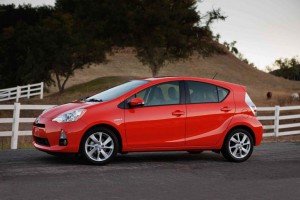
The typical 2025 model will have to offer even better mileage than the new Toyota Prius C, if proposed CAFE rules are enacted.
Despite the recent decline in fuel prices, American motorists still want significantly higher fuel economy from the cars and trucks they buy, according to a new study that found nearly nine in ten of those surveyed want the U.S. to reduce oil consumption while three in four support a proposed increase in the federal mileage standard to 54.5 mpg.
The new report by the Consumer Federation of America was not-so-coincidentally released just before the government is set to finalize a major — and still-controversial – increase in the Corporate Average Fuel Economy, or CAFE, standard. The Obama Administration says it plans to nearly double mandated mileage by 2025.
“The 54.5 mpg by 2025 standard will be one of the most important consumer protection measures to be adopted in decades,” said Mark Cooper, Director of Research for CFA, an association of nearly 300 nonprofit consumer advocacy organizations across the country.
“Record spending on gasoline for American families, combined with consumer demand for better mileage and a broad political consensus over higher national standards, are driving faster improvements in fuel economy than at any time since the oil price shocks of the 1970s,” added Cooper.
Separately, research by the University of Michigan Transportation Research Institute, or UMTRI, finds that the average new vehicle sold this year is delivering about 17% better mileage than comparable products sold when the monthly survey began in October 2007.
But UMTRI data also show that after reaching an all-time peak in April of this year – at the same time fuel prices hit their most recent peak – the fuel economy average has fallen by several tenths of a mile per gallon. That reflects a modest shift back to less efficient products, according to researchers – but that may also be driven, in part, by reviving demand for full-size pickups and other work trucks as the economy recovers.
Even then, fuel economy has been rising in all segments of the market, proponents of the CAFE increase note. Ford, for example, now sells more higher-mileage V-6s than traditional V-8s for its F-Series pickups.
According to a CFA poll of 1,000 adults – with a potential sampling error of plus or minus three percent:
- 88% said the U.S. should reduce oil consumption;
- Those who said that is a “very important” goal want to get at least 5 mpg more fuel economy from their next vehicle;
- 74% said the new 54.5 mpg CAFE standards are a good idea;
- Significantly, 66% said they’d support the higher standards even if that meant higher sticker prices.
“It is clear that consumers have a growing appetite for fuel economy,” said Cooper. “As more fuel-efficient vehicles penetrate the market, I fully expect the preference for even higher fuel economy to strengthen.”
How much consumers might have to spend to meet the next-generation CAFE standards remains a matter of intense debate. The Center for Automotive Research, in Ann Arbor, Michigan, warned the figure could be close to $10,000 per vehicle by 2025. But advocates of higher mileage have countered that the figure was way out of line and have suggested their research puts it at closer to $2,000 to $3,000.
In part, the final numbers will likely depend on what it takes to get to a 54.5 mpg average. Heavy reliance on battery-based drivetrains, carbon fiber body panels and other extreme technologies could drive costs up substantially. But advocates insist there are still plenty of ways to work with existing technologies, such as ultra-high strength steels, and the time-tested internal combustion engine.
The new CFA report notes that sticker prices have risen far less over the last decade than some had warned – even while achieving significant savings on fuel. It points to the Chevrolet Malibu sedan, contending that mileage-based upgrades alone added $348 to the car’s sticker price since 2002. Over the same decade, said CFA, those improvements yielded $2,885 in fuel cost savings.
“In every case, for a variety of models, the savings from spending less on gas far outweighed the additional cost of buying a more fuel-efficient vehicle,” said Jack Gillis, Director of Public Affairs for CFA and author of The Car Book. “The results demonstrate that fuel economy is an investment that pays off many times over for consumers.”
While many manufacturers have debated the merits of boosting CAFE to 54.5 mpg there was a generally broad sign-off on the compromise proposal – which originally saw the government pushing for mileage numbers well in excess of 60 mpg. That is no surprise, proponents contend since most makers now find through their own surveys that fuel economy has become the single most important factor for American car buyers.
